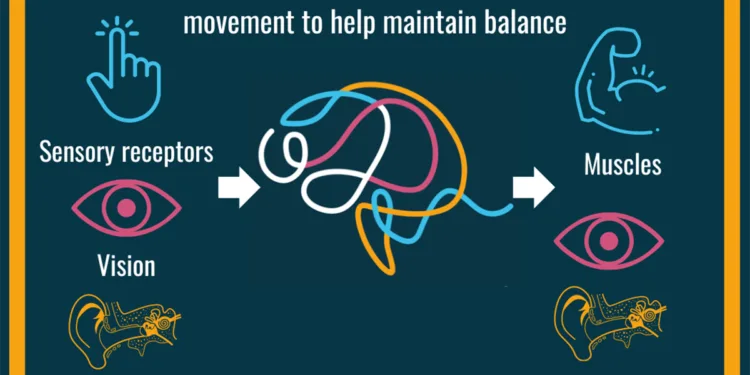Balance is our ability to maintain an upright posture against gravity, making sure we don’t fall over.
Our balance systems allow us to:
- Look around while we are moving.
- Change direction and speed of movement.
- Stay upright against gravity so we don’t fall over.
- Make automatic adjustments to our body to keep us stable and upright.
- Maintain our posture and stability in lots of different conditions and activities.
Balance is a complex interaction between our systems. We need sensory input to give us information about the world around us, our position and posture relative to the world around us and whether we are moving or still. This sensory input travels to the brain where it is integrated so that a decision can be made about the motor output needed. Motor output is the brain’s messages to our muscles.
Sensory Input
There are three systems for sensory input:-
Vision
Our vision helps us to orientate in relation to the world around us. We can see what is moving towards us and away from us and see objects as we move towards them and past them. It helps us to navigate the world and to avoid obstacles. It also gives us some information about where upright is, especially if one of our other sensory input systems is not working so well.
Vestibular System
The vestibular system is the balance organs in our inner ears. They tell the brain about the position of our head and head movement. In each ear, we have a set of three tubes called the semi-circular canals which sense when we move our head and work with the eyes to keep our vision clear. There are also two structures in each ear called the otoliths. They tell the brain when the head is moving (e.g. in a car or a lift) and sense the head position even when it is still.
Sensory receptors
The sensory receptors are nerve endings that pick up information from our body. They are in the skin, muscles and joints and they are what helps us to feel the world around us and to help our brain understand the position of our body parts and how they are moving.
Integration by the brain
All the sensory information from the eyes, vestibular system and sensory receptors travels to the brain where it integrates and sorts the information before deciding how to best control balance in a particular situation. For example, walking in the dark the brain uses more information from the legs and the vestibular system because information from the eyes will not be as accurate. Walking on a sandy beach the brain will use information from the eyes and vestibular system more as the information from the legs and feet will feel less reliable. This switching between the sensory systems and generating the right movement (motor output) is critical to having good balance.
Motor Output
The motor output is the messages that the brain sends to the muscles in the eyes and the body to make sure we keep our balance.
Muscles
The motor output to muscles allows our body to respond to the world around us – e.g. walking on uneven ground, saving ourselves if we trip and making fine adjustments to keep us upright.
The Vestibular System and Eyes
We have a very fast link between our vestibular system and eyes called the Vestibulo-ocular Reflex (VOR) which co-ordinates movement between the eyes and the head to keep our gaze stable when we are moving e.g. walking or in a car
The motor output to the eyes helps to keep them on target via the VOR and allows the eyes to take in visual information about the world around us.
When it goes wrong
As we have seen the human balance system involves a complex set of sensory and motor systems. Balance can be affected by damage to any one of the systems or the brain, through injury, disease, or the ageing process.
Impaired balance can lead to falls, loss of confidence and reduced mobility. It can be accompanied by other symptoms such as dizziness, vertigo, vision problems, nausea, fatigue, and concentration difficulties.
At Neurobility we understand how balance works and can help to work out which systems are not working, then help to restore them or compensate for a permanent loss. We have a Vestibular Specialist Physiotherapist who can assess and treat dizziness, vertigo and other vestibular conditions. We can screen for vestibular problems that may be contributing to impaired balance. Visit our webite to learn more










